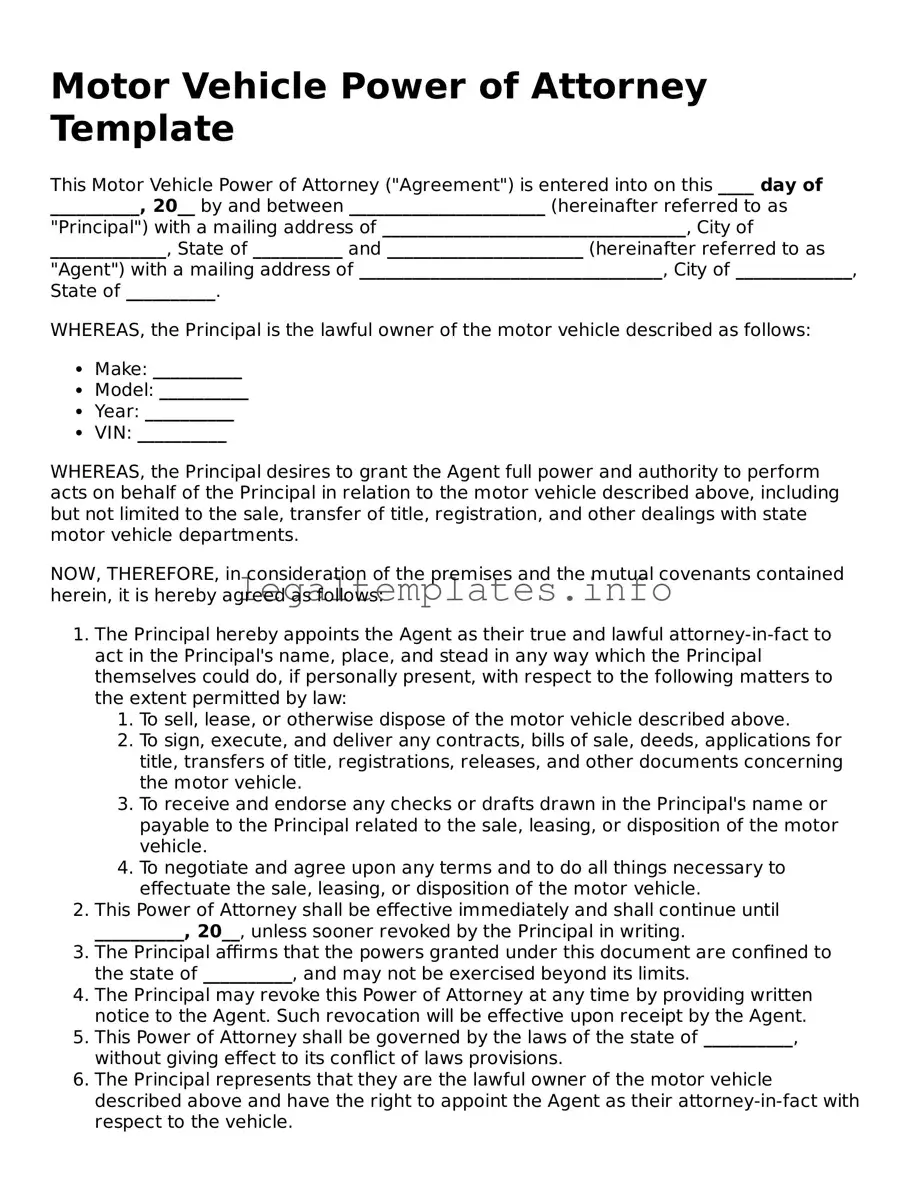Motor Vehicle Power of Attorney Template
This Motor Vehicle Power of Attorney ("Agreement") is entered into on this ____ day of __________, 20__ by and between ______________________ (hereinafter referred to as "Principal") with a mailing address of __________________________________, City of _____________, State of __________ and ______________________ (hereinafter referred to as "Agent") with a mailing address of __________________________________, City of _____________, State of __________.
WHEREAS, the Principal is the lawful owner of the motor vehicle described as follows:
- Make: __________
- Model: __________
- Year: __________
- VIN: __________
WHEREAS, the Principal desires to grant the Agent full power and authority to perform acts on behalf of the Principal in relation to the motor vehicle described above, including but not limited to the sale, transfer of title, registration, and other dealings with state motor vehicle departments.
NOW, THEREFORE, in consideration of the premises and the mutual covenants contained herein, it is hereby agreed as follows:
- The Principal hereby appoints the Agent as their true and lawful attorney-in-fact to act in the Principal's name, place, and stead in any way which the Principal themselves could do, if personally present, with respect to the following matters to the extent permitted by law:
- To sell, lease, or otherwise dispose of the motor vehicle described above.
- To sign, execute, and deliver any contracts, bills of sale, deeds, applications for title, transfers of title, registrations, releases, and other documents concerning the motor vehicle.
- To receive and endorse any checks or drafts drawn in the Principal's name or payable to the Principal related to the sale, leasing, or disposition of the motor vehicle.
- To negotiate and agree upon any terms and to do all things necessary to effectuate the sale, leasing, or disposition of the motor vehicle.
- This Power of Attorney shall be effective immediately and shall continue until __________, 20__, unless sooner revoked by the Principal in writing.
- The Principal affirms that the powers granted under this document are confined to the state of __________, and may not be exercised beyond its limits.
- The Principal may revoke this Power of Attorney at any time by providing written notice to the Agent. Such revocation will be effective upon receipt by the Agent.
- This Power of Attorney shall be governed by the laws of the state of __________, without giving effect to its conflict of laws provisions.
- The Principal represents that they are the lawful owner of the motor vehicle described above and have the right to appoint the Agent as their attorney-in-fact with respect to the vehicle.
IN WITNESS WHEREOF, the Principal has executed this Motor Vehicle Power of Attorney on the date first above written.
Principal’s Signature: ___________________________
Agent’s Signature: ___________________________
State of __________ )
County of __________ ) ss:
On this ____ day of __________, 20__, before me, the undersigned officer, personally appeared ______________________ and ______________________, known to me (or satisfactorily proven) to be the persons whose names are subscribed to the within instrument, and acknowledged that they executed the same for the purposes therein contained.
In witness whereof, I hereunto set my hand and official seal.
Notary Public: ___________________________
My commission expires: __________.

